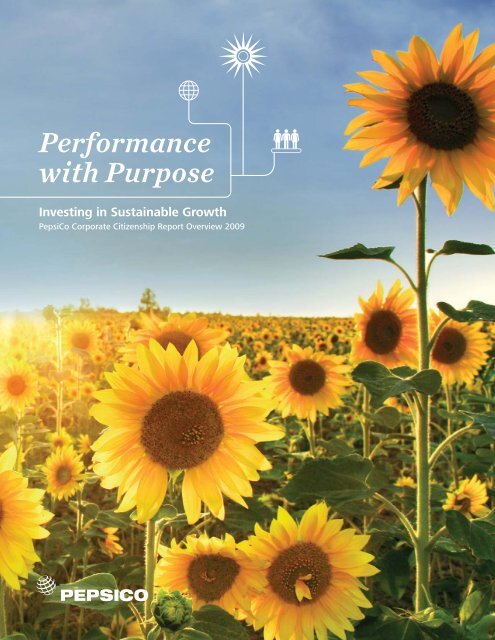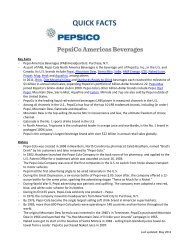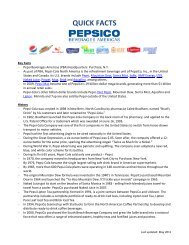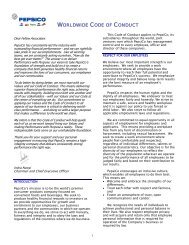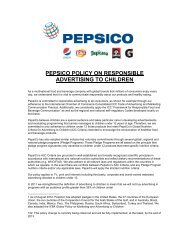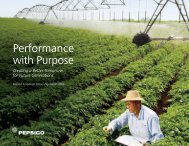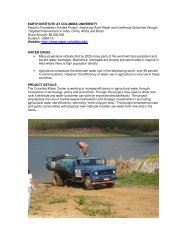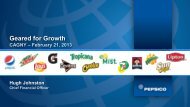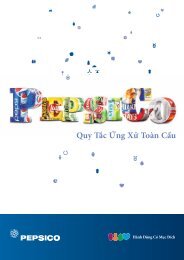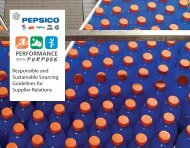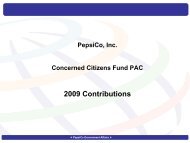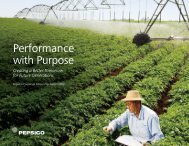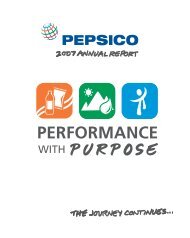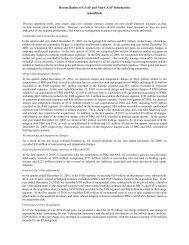2009 Sustainability Report - PepsiCo
2009 Sustainability Report - PepsiCo
2009 Sustainability Report - PepsiCo
- No tags were found...
You also want an ePaper? Increase the reach of your titles
YUMPU automatically turns print PDFs into web optimized ePapers that Google loves.
Performancewith PurposeInvesting in Sustainable Growth<strong>PepsiCo</strong> Corporate Citizenship <strong>Report</strong> Overview <strong>2009</strong>
CONTENTS1 Message from our ChairmanPROMISE OF PEPSICO2 <strong>PepsiCo</strong> Goals and CommitmentsOur ProgressPERFORMANCE4 Our Business, Our Goalsand CommitmentsOur ValuesHUMAN SUSTAINABILITY6 Our Goals and Commitments7 Addressing GlobalNutrition Challenges8 Global Snacks & Foods9 Global Beverages10 Changing the Way We Innovate11 Promoting Active, Healthy Lifestyles12 Product HighlightsAt <strong>PepsiCo</strong> we believe that what is good for societyand what is good for business can and should bethe same thing. We believe in “Performance withPurpose” and we act on this daily, deliveringsustainable growth while investing in a healthierfuture. This is our promise and our mission.By acting on this mission we work to contribute to a sustainable environment, fostera culture of diversity and inclusion, create economic opportunities in the communitieswhere we operate, and develop products and influence policies that can improveour consumers’ health and well-being. Our mission keeps us focused on deliveringon short-term commitments while staying strong over the long term so that we arewell-prepared to deliver sustainable growth for our business and society.ENVIRONMENTALSUSTAINABILITY14 Our Goals and Commitments15 Taking Action to Minimize Our Footprint16 Achieving Positive Water Balance17 Moving Toward Zero Landfill18 Reducing the Carbon Footprintof Our Operations19 Protecting Natural Resourcesin Our CommunitiesTALENT SUSTAINABILITY20 Our Goals and Commitments21 Staying Competitive with a Highly Skilled,Diverse Workforce22 Strengthening an Inclusive Culture23 Providing a Safe, Healthy Workplace23 Recognizing Associates with AwardsProgramsSUMMARY24 Our Corporate Citizenship <strong>Report</strong>24 Awards and RecognitionThis Overview report summarizes ourmost signifi cant accomplishments thatpositively impact people and our planetand states our goals and commitmentsand our progress against them. Ouronline <strong>2009</strong> Corporate Citizenship <strong>Report</strong>is our principal means of reportingand offers more details about our goals,our performance, our policies, ourpartnerships and our governance onthe topics covered in this Overview.www.pepsico.com/citizenshipreportLaunched ambitious global goalsto deliver sustainable growth byinvesting in ahealthier futurefor our consumers, our planet,our associates and partners andour communitiesAwarded more than $20 million inU.S. grants to ideas that positivelyimpact our communities throughthe Pepsi Refresh ProjectCreated3,200new jobs in ChinaIncreased executive positionsheld by women globally to 30%Conserved more than12 billion litersof waterthrough efficiency improvementswithin our operations as comparedto the 2006 baselineAchieved positive water balancein <strong>PepsiCo</strong> IndiaCommitted more than$13 millionto provide safe access to water inChina, India, Brazil and Africa since2007 through the <strong>PepsiCo</strong> FoundationAchieved the highest score incorporate governance for twoconsecutive years in theDow Jones <strong>Sustainability</strong> Worldand North America indexesAchieved a16% reductionin per unit use of energyin our beverage plants and a7% reductionin our snack plants in <strong>2009</strong>compared to a 2006 baselineNearly doubled our“good-for-you” product portfolioover the last five years
Dear Fellow Stakeholders,In <strong>2009</strong>, <strong>PepsiCo</strong> made a promise. We promised to deliver sustainablegrowth by investing in a healthier future for our consumers, our planet,our associates and external partners and the communities we serve.This promise is the cornerstone of our “Performance with Purpose”mission: our belief that our financial success — Performance — mustgo hand-in-hand with our social and environmental responsibilities —our Purpose. We call this “The Promise of <strong>PepsiCo</strong>,” a declarationthat includes ambitious global goals — 47 commitments in all — thatwill guide our company this decade.As the world’s second-largest food and beverage business, we have aresponsibility to help devise solutions to key global challenges wherewe can have the most impact. We categorize these responsibilitiesin three distinct areas: Human <strong>Sustainability</strong> — addressing diverseand complex global nutrition needs; Environmental <strong>Sustainability</strong> —being a good steward of our planet’s natural resources; and Talent<strong>Sustainability</strong> — creating employment opportunities and developingour associates while fostering a diverse and inclusive workplace.Our strategy for long-term growth is an integral part of our“Performance with Purpose” mission. In fact, we design our businessplans to ensure that the work we do and the investments we makeleave a positive impact on society — that’s why our <strong>2009</strong> CorporateCitizenship <strong>Report</strong> is titled Performance with Purpose: Investing inSustainable Growth.Challenging economic times are still ahead, but we will not reduce ourcommitment to responsible business, and we are taking action toensure sustainable, profitable growth across all our businesses. Despitemany challenges, we see enormous opportunity for continued growth.One path to growth is through the game-changing mergers with ourtwo anchor bottlers. These mergers allow us to create a lean, agileorganization with an optimized supply chain, a flexible go-to-marketsystem and enhanced innovation capabilities. Another critical pathto growth is to continue to expand our R&D capabilities and increaseinvestments to develop more nutritious products that taste great andadd positive nutrition such as fiber, protein, vitamins and calcium,among other benefits.Our “Performance with Purpose” mission guides the way we conductourselves as we continue to seek valuable counsel from key externalstakeholders like Ceres, Columbia Earth Institute and global experts inthe nutrition, science and global health policy communities. Together,these actions will help us maintain our long-term commitment to theoverall sustainability of our company.To learn more about our global goals and progress, please see ouronline report prepared using Global <strong>Report</strong>ing Initiative’s (GRI) G3Guidelines at www.pepsico.com/citizenshipreport.HUMAN SUSTAINABILITYAs the world’s nutrition needs continue to evolve, we are committedto encouraging people to live healthier by offering a portfolio ofboth enjoyable and wholesome foods and beverages. We’re addingmore whole grains, nuts, fruits and vegetables while reducing addedsugars, lowering sodium and saturated fat levels and moving toheart-healthier oils and natural sweeteners. We’re also embarkingon many initiatives to improve calorie labeling, support nutritioneducation, bring physical education to schools and feed malnourishedpeople in lower-income communities. Our R&D investment hasincreased by more than 40 percent over three years, helping us tostep across industry boundaries to address core challenges to makeour products more nutritious.ENVIRONMENTAL SUSTAINABILITYWhile we continue to make great strides on our portfolio transformation,we are also committed to improving the environmental profileof our operations worldwide. Most recently, we opened a facility inChongqing, China that is designed to use 22 percent less water and23 percent less energy than our existing in-country facilities. In the U.S.,our Frito-Lay business developed a fully compostable 10 1/2-ouncebag for our SunChips multigrain snacks, and the facility in Arizona thatproduces these snacks just received the Environmental Contributionof the Year award at the 2010 Global Water Awards. One of ourgoals is to achieve positive water balance across all our businesses.For every liter we use, we intend to return one to the Earth. Soundimpossible? We’re already demonstrating that concept across ourIndia beverage operations. And India is just one step in our journey.TALENT SUSTAINABILITYAnother crucial element of our promise is our commitment to investin our associates so they can succeed and develop the skills neededto drive our growth. As part of this, we have made our training anddevelopment regimen more robust, providing additional experientiallearning for key executives to build leadership skills, and ensuringour associates have the right skills to successfully lead us into thefuture. We also remain committed to strengthening our diverse andinclusive culture. We are proud of the progress we continue tomake, including increasing the number of women in managementglobally, reducing diversity turnover and creating thousands of newjobs in growing markets. Our efforts have earned external recognitionin key talent and workplace rankings, including Fortune magazine’s“Top Companies for Leaders” list in <strong>2009</strong>.CONCLUSIONWe’ve made significant progress toward sustainable growth over thepast several years, and as we continue to carry out our “Performancewith Purpose” mission, we are poised to deliver on the “Promise of<strong>PepsiCo</strong>.” I look forward to a continued legacy of solid performance,and I’m confident our focus on sustainable growth will go a longway to assuring <strong>PepsiCo</strong> thrives for decades to come.Indra K. NooyiChairman and Chief Executive Officer
At <strong>PepsiCo</strong>, “Performance with Purpose”means delivering sustainable growth byinvesting in a healthier future for peopleand our planet.As a global food and beverage company with brands that stand for quality and are respectedhousehold names — Quaker Oats, Tropicana, Gatorade, Lay’s and Pepsi-Cola, to name afew — we will continue to build a portfolio of enjoyable and wholesome foods and beverages,find innovative ways to reduce the use of energy, water and packaging, and provide agreat workplace for our associates.Additionally, we will respect, support and invest in the local communities where we operateby hiring local people, creating products designed for local tastes and partnering with localfarmers, governments and community groups. Because a healthier future for all people andour planet means a more successful future for <strong>PepsiCo</strong>. This is our promise.PerformanceTO ALL OF OUR INVESTORS: It’s a promiseto strive to deliver superior, sustainablefinancial performance.Human <strong>Sustainability</strong>TO THE PEOPLE OF THE WORLD: It’s apromise to encourage people to livehealthier by offering a portfolio of bothenjoyable and wholesome foods andbeverages.Environmental <strong>Sustainability</strong>TO THE PLANET WE ALL SHARE: It’s apromise to be a good citizen of the world,protecting the Earth’s natural resourcesthrough innovation and more efficientuse of land, energy, water and packagingin our operations.Talent <strong>Sustainability</strong>TO THE ASSOCIATES OF PEPSICO: It’s apromise to invest in our associates tohelp them succeed and develop the skillsneeded to drive the company’s growth,while creating employment opportunitiesin the communities we serve.2 <strong>PepsiCo</strong> Corporate Citizenship <strong>Report</strong> <strong>2009</strong>
Select Goals and CommitmentsFor more information on each of our 47 global commitmentsand progress, please visit www.pepsico.com/goalsandcommitments.OUR COMMITMENTOUR PROGRESSGrow international revenues at two times realglobal GDP growth rateIn <strong>2009</strong> — a year in which the global Gross Domestic Product (GDP)declined — we grew international revenues. Over the last three years,we grew international revenues at a 13.6% Compounded AnnualGrowth Rate (CAGR), well ahead of our goal of growing at double therate of real global GDP growth.Increase the amount of whole grains, fruits,vegetables, nuts, seeds and low-fat dairy inour global product portfolioReduce the average amount of sodium per servingin key global food brands, in key countries,by 25% by 2015, with a 2006 baselineReduce the average amount of saturated fat perserving in key global food brands, in key countries,by 15% by 2020, with a 2006 baselineReduce the average amount of added sugars perserving in key global beverage brands, in keycountries, by 25% by 2020, with a 2006 baselineOur Gamesa-Quaker business delivered nearly 1.4 billion servingsof whole grains in Mexico.In the U.K., the business achieved a 10% further reduction of saltin Walkers Crisps, following salt reductions between 25% and 55%since 2003.Since 2005, we’ve been working toward reducing saturated fat in oursnacks by switching to healthier oils. In the U.S., Frito-Lay has reducedsaturated fats by 50% in its Lay’s and Ruffles brands since 2006.Gatorade’s G2 is a low-calorie sports beverage that has half the sugarand still delivers functional hydration benefits that athletes need tocompete. Tropicana’s Trop50 juice has 50% less sugar and calories.Improve our water use efficiency by 20%per unit of production by 2015Reduce our fuel-use intensity by 25%per unit of production by 2015Continue to lead the industry by incorporating atleast 10% recycled polyethylene terephthalate (rPET)in our primary soft drink containers in the U.S.,and broadly expand the use of rPET across keyinternational marketsWe conserved more than 12 billion liters of water through eco-efficiencyimprovements within our global operations.There has been an 18% reduction in per unit consumption ofnon-renewable fuels in beverage operations and an 8% reductionin our snack operations since 2006.<strong>PepsiCo</strong> continues to be the industry leader in our use of rPET with10% recycled content in carbonated soft drink bottles in the U.S.,and Naked Juice commercialized the first 100% recycled PET bottlein the U.S. grocery channel.Foster diversity and inclusion by developinga workforce that reflects local communitiesEnsure a safe workplace by continuing to reduceLost-Time Injury Rates while striving to improveother occupational health and safety metricsthrough best practicesWe’ve increased the percentage of women executives globally to 30%.In addition, we spent nearly $1.3 billion on minority and women-ownedbusinesses in <strong>2009</strong> — a 41% increase since 2005.Reduced our Lost-Time Injury Rate by 25% in our global manufacturingoperations in <strong>2009</strong>.more info: pepsico.com/citizenshipreport 3
PerformanceTO ALL OF OUR INVESTORS: It’s a promise to strive todeliver superior, sustainable financial performance.Our Goals and CommitmentsTop LineGrow internationalrevenuesat two times real globalGDP growth rate.Grow savory snackand liquid refreshmentbeverage marketshare in thetop 20 markets.Sustain or improvebrand equity scoresfor <strong>PepsiCo</strong>’s19 billion-dollar brandsin thetop 10 markets.Rank among thetop two suppliers incustomer(retail partner)surveys where third-partymeasures exist.Continue to expanddivisionoperating margins.Bottom LineDeliver total shareholderreturns in thetop quartile of ourindustry group.Increase cashflow inproportionto net incomegrowth over three-yearwindows.Corporate Governance and ValuesUtilize a robustcorporate governance structure tobest represent the interestsof <strong>PepsiCo</strong> and its shareholders.Ensure our <strong>PepsiCo</strong>value commitment to deliversustained growth through empoweredpeople acting withresponsibility and building trust.4 <strong>PepsiCo</strong> Corporate Citizenship <strong>Report</strong> <strong>2009</strong>
ValuesOUR COMMITMENTTo deliver Sustained Growth throughEmpowered People acting withResponsibility and Building TrustGuiding PrinciplesWE MUST ALWAYS STRIVE TO• Care for customers, consumersand the world we live in• Sell only products we can beproud of• Speak with truth and candor• Balance short term andlong term• Win with diversity and inclusion• Respect others and succeedtogetherPerformance MetricsIn <strong>2009</strong>,Total net revenue wasmore than $43 billionMIX OF NET REVENUESBeveragesFoodsOutside U.S.U.S.NET REVENUESAMEA13%37%48%52%63%100%We reach more than1 billion retail outletson a regular basis.Europe16%23%Beverages 1 48%Foods 2 100%1<strong>PepsiCo</strong> Americas Beverages2<strong>PepsiCo</strong> Americas FoodsGlobal snack leaderwith the top-ranked savory categoryshare position in key regionsWe operate 692 manufacturing facilities * .We operate 100,000 distribution routesdirectly or through our own fleets or throughthose of our bottlers worldwide. We continuouslylook for ways to reduce emissions from our fleet.* Co-packers are not included; only franchises and company-owned operations.Includes PBC North America.more info: pepsico.com/citizenshipreport 5
Human <strong>Sustainability</strong>TO THE PEOPLE OF THE WORLD: It’s a promise toencourage people to live healthier by offering a portfolioof both enjoyable and wholesome foods and beverages.Our Goals and CommitmentsProductsProvide more food and beverage choices made with wholesomeingredients that contribute to healthier eating and drinking.Increase the amount ofwhole grains, fruits,vegetables, nuts, seeds andlow-fat dairy in our globalproduct portfolio.Reduce the average amountof sodium per servingin key global food brands,in key countries,by 25 percent by 2015, witha 2006 baseline.Reduce the averageamount of saturated fatper serving in keyglobal food brands, inkey countries, by 15 percentby 2020, with a 2006baseline.Reduce theaverage amount of addedsugars per serving in keyglobal beverage brands, inkey countries, by 25 percentby 2020, with a 2006baseline.MarketplaceEncourage people to make informed choicesand live healthier.CommunityActively work with global and local partnersto help address global nutrition challenges.Display calorie countand key nutrients onour food and beveragepackaging by 2012.Eliminate thedirect sale of full-sugarsoft drinks toprimary and secondaryschools around theglobe by 2012.Advertise to childrenunder 12 only productsthat meet our globalscience-based nutritionstandards.Increase the rangeof foods and beveragesthat offer solutionsfor managing calories,like portion sizes.Invest in our businessand research anddevelopment to expandour offeringsof more affordable,nutritionally relevantproducts for underservedand lower-incomecommunities.Expand <strong>PepsiCo</strong>Foundation and <strong>PepsiCo</strong>Contribution initiatives topromote healthiercommunities, includingenhancing dietand physical activityprograms.Integrate our policies and actionson human health, agricultureand the environmentto ensure they support each other.6 <strong>PepsiCo</strong> Corporate Citizenship <strong>Report</strong> <strong>2009</strong>
Addressing GlobalNutrition ChallengesWe are the world’s second-largest food and beverage business.Our brands — which include Quaker Oats, Tropicana, Gatorade,Frito-Lay and Pepsi — are household names that stand for superiorquality and great taste throughout the world. As a global company,we also have strong regional brands such as Walkers in the U.K.,Gamesa and Sabritas in Mexico, Amacoco in Brazil, Lebedyanskyin Russia, Alvalle in Spain and Smith’s in Australia.As an industry leader, we have a responsibility to help developsolutions to key global challenges, such as obesity. We will do thisby transforming our product portfolio, establishing global initiatives,such as calorie labeling to improve nutrition education, supportingprograms that promote physical activity and using our influenceto engage in meaningful private-public partnerships to drivepositive change.In <strong>2009</strong>, we announced 11 ambitious global goals and commitmentsto guide our work to help improve the well-being of people in bothdeveloped and developing countries. We are focusing our work onthe products we make and on key policies and partnerships to helpus address global nutrition challenges.Through expanded capabilities and increased investment, our worldclass research and development (R&D) team is focused on providingmore food and beverage choices that encourage people to livehealthier — products that are made with wholesome ingredients,and which offer nutritional benefits.Our consumers’ tastes, preferences and needs are constantly changing,and our success depends on our ability to respond to consumertrends and evolving nutrition challenges, including responding tothe consumer’s desire for healthier choices.We will continue making our core snacks and beverages healthierthrough innovations in heart-healthy oils, sodium reduction andnatural sweeteners, and through the addition of whole grains, fruitsand vegetables, nuts, and low-fat dairy.Currently, we have an estimated $10 billion portfolio of nutritiousproducts anchored by: Tropicana, Naked Juice, Lebedyansky, Sandoraand other juice brands; Aquafina water, Kero Coco and Trop Cocococonut water brands; Quaker Oats; Gatorade (for athletes); dairyproducts from our new joint venture with Almarai; and other localgood-for-you products and brands.Currently, we have an estimated$10 billionportfolioof nutritiousproducts.We intend to build on this portfolio with an increasing stream ofinnovation, as well as from targeted acquisitions and joint ventures.We will invest to accelerate the growth of these platforms, andwe will use the knowledge from these initiatives to improve our coreproduct offerings and to develop highly nutritious products formalnourished and lower-income communities around the world.Each day we work toward our goals through product innovationgrounded in nutrition science and the use of natural ingredients andby developing partnerships to guide and inform our work. We’reusing the lessons gained from our global vantage point not only toimprove our business, but also to help address the world’s evolvingnutrition needs.more info: pepsico.com/citizenshipreport 7
Adding Whole Grains While Naturally ReducingSaturated Fat and Salt in Global Snacks and FoodsAs a company focused on achieving sustainable growth, we havesignificant opportunities to expand our current snacks businessesin key regions, extend our reach into new geographies and enteradjacent categories. Last year, we were the global snacks leaderwith the #1 savory category position in virtually every key regionacross the globe.As we expand our snacks business, we will continue to make ourcore snacks healthier through nutrition science-based innovationssuch as adding whole grains, nuts and seeds, using heart-healthyoils and reducing saturated fats and sodium.PEPSICO U.K. INVESTMENT IN HEALTHIER OILtotal additional cost versus previous year2008200720062005£3.2m2004 £1m£8.6m£13.8m£21.4mIn <strong>2009</strong>, <strong>PepsiCo</strong> announced global goals and commitments thataddress environmental and social issues, including goals focused onthe diverse and complex nutrition needs around the world.Among our numerous global goals, <strong>PepsiCo</strong> committed to increasingthe amount of whole grains, nuts and seeds, reducing the averageamount of saturated fat per serving in key global food brands by15 percent by 2020, and reducing the average amount of sodiumper serving in key global food brands by 25 percent by 2015.We’ve made good progress on all three fronts. In Mexico, ourbusiness delivered 1.4 billion servings of whole grains through ourGamesa-Quaker snacks, oats, and cereals last year. We expect tocontribute an additional 22 million pounds of whole grain to theAmerican diet in 2010 as we modify our process to retain moreof the whole grain in Tostitos tortilla chips. And today, <strong>PepsiCo</strong> isthe world’s #2 seller of nuts and seeds.Since 2005, we’ve led the industry to reduce saturated fats in oursnacks like Walkers crisps in the U.K. and Lay’s potato chips in keyglobal markets by investing in the use of heart-healthy oils suchas sunflower oil.In the U.K., we’ve reduced the saturated fats in Walkers crisps by70 to 80 percent, removing more than 40,000 tons of saturated fatfrom the British diet from 2005 to 2008. In the U.S., we’ve switchedto sunflower oil, which is very low in saturated fat, and reducedthe saturated fat content by more than 50 percent in our Lay’sand Ruffles potato chips. In sum, more than 100 million pounds ofsaturated fats have been removed from the American diet since 2006.We continue to invest in R&D capabilities to identify natural, innovativeapproaches to reduce the sodium in our global food brands.Since 2003, we’ve reduced salt levels by between 25 and 55 percentacross the Walkers portfolio, removing 2,400 tons of salt from theBritish diet between 2003 and 2008. At the end of <strong>2009</strong>, wereduced salt levels in Walkers crisps by an additional 10 percent.To achieve our global sodium reduction goal, we will continue tomake R&D investments to explore breakthrough solutions such asidentifying unique natural salt shapes and sizes that deliver the great“salty” taste while actually using less sodium.8 <strong>PepsiCo</strong> Corporate Citizenship <strong>Report</strong> <strong>2009</strong>
Looking to Nature to Reduce Added Sugars, Add PositiveNutrition, and Preserve Flavors in Global BeveragesOne of the beverage industry’s biggest technical challenges is toreduce a product’s sugar while preserving its flavor. We’ve unlocked asolution by looking to nature and creating a breakthrough innovation.<strong>PepsiCo</strong> and the Whole Earth Sweetener Company introduced azero-calorie, all-natural sweetener derived from the stevia plantnamed PureVia. This natural sweetener optimizes taste, preservesthe beverage’s natural great-tasting flavor and retains shelf life.Today, SoBe Lifewater, which is a vitamin-enhanced water with ahigh level of antioxidants, contains the zero-calorie, all-naturalsweetener, as does Tropicana’s Trop50. Trop50 offers 50 percent lesssugar and calories by using PureVia and is the juice industry’s mostsuccessful launch in the past five years. In addition, this all-naturalsweetener innovation has been applied to Gatorade, the #1 sportsdrink brand in the U.S., to produce G2 Gatorade. With only 20 caloriesper 8-ounce serving, G2 delivers the same electrolytes as Gatoradeto help maintain hydration.In <strong>2009</strong>, <strong>PepsiCo</strong> announced ambitious global goals and commitmentsthat address environmental and social issues including goals focusedon the diverse and complex nutrition needs around the world.We are committed to increasing the amounts of fruits, vegetablesand low-fat dairy in our global product portfolio, and to reducingthe average amount of added sugars per serving in key globalbeverage brands by 25 percent by 2020. Progress has been made,but there is still a lot to learn and do.We’re enhancing our portfolio of great-tasting, lower-calorie beverageofferings within our key brand portfolios such as the Pepsi trademark,which includes Pepsi, Diet Pepsi, Pepsi Max and Pepsi Kick.Pepsi Max is the fastest-growing beverage internationally with a“no sugar” label and has had successful product launches acrossthe Middle East and China. In <strong>2009</strong>, Pepsi Max became <strong>PepsiCo</strong>’s19th billion-dollar mega-brand.As our global beverage business grows, key acquisitions and jointventures have helped us expand our product offerings withimproved nutritional profiles. Our focus on more nutritious offeringsstarted with our acquisition of Tropicana in 1998 and the 2001merger with Quaker Oats, including Gatorade.More recently, <strong>PepsiCo</strong> has acquired or purchased a major stake inLebedyansky, Russia’s leading branded juice company and the world’ssixth largest juice manufacturer; Sandora, a leading juice companyin Ukraine; Naked Juice, a premium juice company in the U.S.;V Water in the U.K.; and Amacoco, Brazil’s largest coconut watercompany. We have also partnered with one of the world’s mostprofitable dairy businesses — Almarai — to jointly develop dairymarkets throughout the Middle East, Southeast Asia and Africa.In <strong>2009</strong>, <strong>PepsiCo</strong> was ranked as the #1 juice business in Europe andRussia following the acquisition of both Lebedyansky and Sandora,and we continue to expand in India and the Middle East. In fact,we’re covering the total value spectrum from premium and mainstreamjuices to value selections.In Russia, we introduced Tonus Active Plus, a new line of juices thatcan help bring a variety of benefits, including a healthy immunesystem with AntiOx, improved digestion with BioFiber or nutrientbasedenergy with Power-C.There continues to be significant areas of global beverage growth,particularly in developing markets and in evolving categories. Wewill invest in those attractive opportunities, concentrating ingeographies and categories in which we are the leader or a closesecond, or where the competitive game remains wide open.more info: pepsico.com/citizenshipreport 9
Encouraging People to MakeInformed Choices and Live Healthier<strong>PepsiCo</strong> is committed to providing clear and useful nutrition labelingthat helps consumers make nutritionally informed choices. Recently,we’ve announced significant global initiatives, goals and commitmentsto guide our work in this area.We have committed to display calorie count and key nutrients onour food and beverage packaging by 2012. In the U.S., <strong>PepsiCo</strong> willdisplay total calorie counts on the front of all beverage containers upto and including 20-ounce packages by February 2012. On beveragecontainers larger than 20 ounces, <strong>PepsiCo</strong> will display calories per12-ounce serving on the front of non-juice products, and calories per8-ounce serving on the front of juices and juice products. <strong>PepsiCo</strong> iscommitted to prominently displaying calorie information in line withU.S. Food and Drug Administration (FDA) guidance and regulations.In an industry-leading and voluntary move, we will eliminate thedirect sale of full-sugar soft drinks to primary and secondary schoolsaround the globe by 2012. Our global sales and distribution policyaims to help schools offer a wider range of low-calorie and nutritiousbeverages to their students. This global policy limits the direct saleof full-sugar soft drinks — and encourages the products sold to meetstrict nutritional criteria — to primary and secondary schools. <strong>PepsiCo</strong>plans to fully implement this policy by January 1, 2012. <strong>PepsiCo</strong>currently does not direct-sell full-sugar soft drinks to primary andsecondary schools in most of Europe, Canada and most countriesin the Arabian Peninsula.We’ve taken a deliberate stand on responsible marketing andadvertising to children and joined a group of global food andbeverage manufacturers to adopt a worldwide voluntary commitmentto advertise to children under 12 only products that meet specificnutrition criteria. The policy is currently in effect for beveragesworldwide and will become effective for all snacks and food globallyby January 1, 2011. <strong>PepsiCo</strong> has already achieved 96 percentcompliance in <strong>2009</strong> in those countries where the company policyis in force, according to the global audit firm Accenture.10 <strong>PepsiCo</strong> Corporate Citizenship <strong>Report</strong> <strong>2009</strong>Changing the Way We InnovateFor generations, we’ve been offering some of the world’s favoritefoods and beverages. And, increasingly, we are focused on improvingour products, developing new ones using nature’s ingredientsand applying proven nutrition science to ensure more wholesomeproducts and nutritional benefits.We believe it is our responsibility to understand the diverse nutritionneeds of populations around the world, and to offer a wide rangeof foods and beverages that addresses those needs.To do that, we’re changing the way we innovate at <strong>PepsiCo</strong>.We’ve expanded our world-class Research and Development (R&D)organization. Our leaders include renowned scientists and experts inclinical science, epidemiology, nutrition and public health. We’veincreased our investment in cutting-edge research and productdevelopment by more than 40 percent over three years, and now havenine R&D facilities around the world.Our R&D organization anticipates demand, solves business problemsand creates opportunities to differentiate our products. This teamdelivers on the future by staying close to the businesses and brands,as well as by understanding the physical and emotional needsof our consumers. Our innovation pipelines feature both global andlocal products that will make it easier for our consumers to leadhealthier lives.We proactively lead and engage in private-public partnerships withkey external experts and stakeholders in the global health policyand science/nutrition communities to help improve diets and deliversubstantial improvements in our products.Our leaders actively participate in global health policy initiatives,including those led by the World Health Organization, NationalInstitutes of Health, World Heart Federation, New York Academy ofSciences, Pan-American Health Organization and the Healthy WeightCommitment Foundation.<strong>PepsiCo</strong> also actively supports the Centers for Disease Control andPrevention (CDC). The CDC is the U.S.’ lead agency for healthpromotion and the prevention and control of diseases. It is also apremier organization worldwide for nutrition, physical activity andobesity prevention.
Influencing Positive ChangePromoting Active, Healthy LifestylesWe touch the lives of tens of millions of people every day. We aredriven by the belief that by joining forces with partners acrossmany sectors, we can make a far greater impact in the fight toreduce obesity and address other global nutrition needs than byworking alone.<strong>PepsiCo</strong> expanded its existing efforts to help reduce obesity in theU.S. by joining the Healthy Weight Commitment Foundation (HWCF).This Foundation is a CEO-led organization and is a national, multiyeareffort designed to help reduce obesity — especially childhood obesity —by 2015. The HWCF intends to help consumers lead healthier livesby offering healthier nutrition options and helping to make energybalance — calories in, balanced with calories out — a daily habit.In <strong>2009</strong>, <strong>PepsiCo</strong> Foundation made a two-year commitment of$2.5 million to the HWCF.<strong>PepsiCo</strong> Foundation also made a $5 million commitment toSave the Children for a three-year program to help ensure thesurvival and well-being of children living in rural India and Bangladesh,which together are home to 40 percent of the world’s malnourishedchildren. A three-year, $2.2 million commitment was made tothe United Nation’s World Food Programme to improve theorganization’s operating efficiencies and response time in crisissituations through strategic counsel and insights from <strong>PepsiCo</strong>’smost seasoned logistics experts.Another example is <strong>PepsiCo</strong>’s Food for Good (FFG) initiative launchedin the Dallas, Texas area in <strong>2009</strong>. The initiative was launched to betterunderstand the needs of underserved communities and exploreways that we could help. Partnerships with community organizationsare essential to the vision, and FFG has partnered with Central DallasMinistries (CDM), Paul Quinn College (PQC) and the Jubilee ParkCommunity to explore various opportunities in the South Dallas/Highland Hills area. FFG aims to improve access to affordable andnutritious foods and help spur economic redevelopment through joband skills development.In 2010, <strong>PepsiCo</strong> will launch a pilot initiative in India that will developlocally relevant, affordable and nutritious products for undernourishedconsumers. And in Nigeria, we are supporting humanitarianorganizations to help improve nutrition for undernourished children.We support programs that use simple steps to encourage people toget active.In Latin America, Vive Saludable Escuelas is a proven initiative thatteaches children how to add physical activity to their daily lives.A physical education routine, designed by Mexico’s Sports Commission,is being used by teachers in participating schools. To date, the programhas touched more than 1 million children in 4,000 schools.In India, our “Get Active” program reaches 70,000 students in morethan 100 schools and promotes an active lifestyle through an energybalance curriculum.In the U.S., we continue to work with the YMCA, the nation’s largestprovider of fitness programs, to support Activate America, a publichealth initiative that helps make healthy living a reality for millionsof Americans.In the U.K., we’ve been a partner of the Department of Health’sChange4Life obesity campaign since its inception in 2008.We launched an unbranded advertising campaign supporting thesub-brand Play4Life. Aimed at encouraging parents to take their kidsout to play more, global football icons Thierry Henry and FrankLampard were used to personalize and drive home the campaign’skey message: “Active parents make active kids.”The U.K. Departmentof Health’s Change4Lifeobesity campaign rannationally in digital,print and bus formats.more info: pepsico.com/citizenshipreport 11
In Mexico, our Gamesa-Quakerbusiness expanded its line ofoat-based cookies and snacksin a variety of portion sizes.<strong>PepsiCo</strong> is thenumber onejuice businessin Europe and Russia with theacquisition of a stake inJSC Lebedyansky and Sandora.In China, we designed Cao BenLe beveragesto supplement the way Chinese consumersuse traditional Chinese herbs by addingchrysanthemumflowers and red dates.In the Middle East, <strong>PepsiCo</strong>launched Aliva, a new biscuitthat combineswheat and lentilswith authenticlocal flavors.Naked Juice introduced100%natural coconut water,a good source of potassium,calcium and other electrolytes.SunChips multigrain snacksare made with18 gramsof whole grains per serving.12 <strong>PepsiCo</strong> Corporate Citizenship <strong>Report</strong> <strong>2009</strong>
In the U.K., we have reduced saturatedfat levels by70% – 80%and salt levels by25% – 55%in Walkers snacks and crisps.In Australia, Grain Wavespotato chips are cooked in100%heart-healthy oils.Pepsi Max is the fastest growingbeverage internationally with ano sugartrademark, following significantproduct launches across theMiddle East and China.<strong>PepsiCo</strong> is the world’s#2 sellerof nuts and seeds.In Europe, our Alvalle line ofsoups are made from freshvegetables and are100%natural.Trop50 usesPureVia, a zero-calorie,all-natural sweetenerderived from the stevia plant.more info: pepsico.com/citizenshipreport 13
Environmental <strong>Sustainability</strong>TO THE PLANET WE ALL SHARE: It’s a promise to bea good citizen of the world, protecting the Earth’s naturalresources through innovation and more efficient use ofland, energy, water and packaging in our operations.Our Goals and CommitmentsWaterRespect the human right to water through world-class efficiencyin our operations, preserving water resources and enabling access to safe water.Improve our wateruse efficiency by 20 percentper unit of productionby 2015.Strive forpositive water balancein our operations inwater-distressed areas.Provide access tosafe water to three million peoplein developing countriesby the end of 2015.Land and PackagingRethink the way we grow, source, create,package and deliver our products to minimizeour impact on land.Continue to lead theindustry by incorporatingat least 10 percentrecycled polyethyleneterephthalate (rPET) in ourprimary soft drinkcontainers in the U.S., andbroadly expand the use ofrPET across key internationalmarkets.Work to eliminateall solid waste to landfillsfrom our productionfacilities.Create partnershipsthat promote theincrease ofU.S. beverage containerrecycling rates to 50 percentby 2018.Reduce packagingweight by 350 millionpounds — avoidingthe creation of one billionpounds of landfill wasteby 2012.Climate ChangeReduce the carbon footprint of our operations.Improve our electricityuse efficiency by 20 percentper unit of productionby 2015.Reduce our fuel-useintensity by25 percent per unit ofproduction by 2015.Commit to a goalof reducing greenhousegas (GHG) intensity forU.S. operations by 25 percentthrough our partnershipwith the U.S. EnvironmentalProtection Agency ClimateLeaders program.Commit to an absolutereduction in GHG emissionsacross global operations.CommunityRespect and responsibly use natural resourcesin our businesses and in the local communities we serve.Apply provensustainable agriculturalpractices on ourfarmed land.Provide funding,technical supportand training to localfarmers.Promote environmentaleducation and best practicesamong our associates andbusiness partners.Integrate our policiesand actions on humanhealth, agricultureand the environment tomake sure that they supporteach other.14 <strong>PepsiCo</strong> Corporate Citizenship <strong>Report</strong> <strong>2009</strong>
Taking Action toMinimize Our FootprintEvery day, <strong>PepsiCo</strong> relies on the Earth’s natural resources. As we growour businesses in developed countries and expand in developingcountries and emerging markets, we remain committed to minimizingthe impact our business has on the environment.In <strong>2009</strong>, we announced 15 global goals and commitments to guideour work to protect our natural resources through innovation andmore efficient use of land, energy, water and packaging in ouroperations. We are focusing our work where we can make the mostpositive impact (water, packaging, climate change and agriculture)and on key policies and partnerships to help provide solutions toaddress the world’s environmental challenges.Our global environmental strategy is guided by our Environmental<strong>Sustainability</strong> Leadership Team, which comprises senior executiveswho lead our businesses’ supply chain, global procurement,compliance, sales and marketing, and R&D, among others. At thefront line of our efforts are <strong>PepsiCo</strong>’s sustainability teams at ourbusiness headquarters and local manufacturing facilities aroundthe globe. Associate volunteers form “Green Teams” that operateat many facilities and through these teams’ actions, we are able tocontinuously improve our programs and look for ways to scale thegood ideas being implemented across our global business. Wealso share best practices with our industry peers and suppliers.Resource conservation is a key priority and we have a globaleco-efficiency strategy within our operations that helps us optimizeour water, energy and electricity use through improved methods andtechnologies. We are moving toward having all our new facilities meetthe U.S. Green Building Council’s (USGBC) Leadership in Energy andEnvironmental Design (LEED) standards — one of the world’s mostrigorous standards for green building.In an industry-leading move, we developed global SustainableEngineering Guidelines (SEG) based on LEED standards. We sharethese guidelines, which contain 135 solution sets and 18 trainingvideos, with our suppliers to ensure our buildings are constructed toenvironmentally sustainable standards. These guidelines are appliedto all new construction as well as major remodels of existingbuildings globally, where practical.As a food and beverage company, agriculture is perhaps the largestelement of our eco-footprint, so we work hard to continuouslyimprove our agricultural practices. We have developed and publishedour Global Sustainable Agriculture Policy, which demonstrates ourapproach to sustainable development across our entire agriculturesupply chain, including water savings, waste reuse, soil protectionand chemical use.In Chongqing, China, our manufacturing facility has an environmentallearning center open to the local community. This center providesfree educational materials to raise awareness about ways to protect theEarth’s natural resources.Our Global Sustainable Packaging Council, which comprises executivesfrom our global procurement and R&D packaging operations, guidesour work in designing and developing packaging systems that areenvironmentally responsible throughout their entire life cycle.In addition to our own efforts, we consistently rely on private-publicpartnerships with a range of external stakeholders to provide us withadditional insights, expertise and knowledge. <strong>PepsiCo</strong>’s commitmentto environmental sustainability is deeply embedded into our dailybusiness practices. With the expert knowledge, world-class skills andbreakthrough technology, our organization is empowered to dobetter each day by minimizing our footprint.more info: pepsico.com/citizenshipreport 15
Achieving Positive Water BalanceIn <strong>2009</strong>, <strong>PepsiCo</strong> India achieved a remarkable milestone:positive water balance.Through numerous initiatives of recharging, replenishing and reusingwater, our business in India gave back to society more water thanconsumed by our in-country beverage manufacturing processes.The team achieved positive water balance by reducing water used tomanufacture our products, conserving water through sustainableagriculture practices and replenishing water in communities whereour operations exist and beyond. In sum, the team replenished nearly6 billion liters of water across India, which exceeds the total intake ofapproximately 5 billion liters of water by our manufacturing facilities.The <strong>PepsiCo</strong> team replenished nearly6 billion litersof water across India, which exceeds the totalintake of approximately 5 billion liters of waterby our manufacturing facilities.This sustainable initiative supports <strong>PepsiCo</strong>’s global goals andcommitments that address environmental and social issues.Among these goals, <strong>PepsiCo</strong> has committed to improve water useefficiency by 20 percent per unit of production by 2015, strivefor positive water balance in our operations in water-distressedareas and provide access to safe water to 3 million people indeveloping countries by the end of 2015.<strong>PepsiCo</strong> routinely conducts assessments to monitor levels of waterstress factors in the areas of our operations and proactively initiateswater replenishment programs around the world. The global watergoals require continuous improvement to reduce our water footprint.Since 2005, our manufacturing team in India has reduced water useby more than 45 percent and saved more than 3 billion liters of waterthrough conservation efforts across our beverage operations.One conservation method includes rain or roof water harvesting,a practice used by many <strong>PepsiCo</strong> India plants to maintain andstrengthen water reserves in the surrounding areas. Three plantsharvest and collect rain water in excavated lakes and ponds as wellas use roof water harvesting to rejuvenate surrounding aquifers.In India, our team has educated farmers to adopt an agronomicpractice in paddy cultivation called “direct seeding.” Rather thangrowing the seedlings in a nursery, planting them, and thenflooding their fields, we are advocating direct seeding, which allowsthe seed to be planted directly into the ground, bypassing thenursery. This also removes the need for flood irrigation, reducingwater use by as much as 30 percent. In <strong>2009</strong>, we extended directseeding to 6,500 acres of paddy fields, saving more than 5 billionliters of water.Through the construction of check-dams and recharge ponds, waterlevels have risen for the first time in years and helped to increasefarmers’ incomes. The check-dam project has positively impacted thelives of 12,000 villagers in communities where our operations exist.To build on the achievement of positive water balance, <strong>PepsiCo</strong> Indiahas developed a strategic plan to double the replenishment of itsconsumption of fresh water by 2015.From a global perspective, <strong>PepsiCo</strong> remains committed to itscomprehensive and integrated movement to conserve and optimizewater usage. Our initiatives reinforce our commitment to theU.N. Global Compact (UNGC), the CEO Water Mandate and theU.N.’s Millennium Development Goals of sustainable access to safedrinking water.16 <strong>PepsiCo</strong> Corporate Citizenship <strong>Report</strong> <strong>2009</strong>
Moving Toward Zero LandfillWe’re working to eliminate all solid waste sent to landfills fromour plants. In the U.S. and U.K., we’ve made considerable progressacross our snack businesses.In <strong>2009</strong>, 14 Frito-Lay manufacturing facilities disposed less than onepercent of solid waste to landfill — the remaining 18 facilities willachieve nearly “zero landfill” by the end of 2011.Over the past five years, Frito-Lay has eliminated 150 square miles ofpackaging by reducing materials by 10 percent. The company hasalso introduced the first fully compostable bag for its 10 1/2- ounceSunChips multigrain chips. Frito-Lay consumes 150,000 tons lesspaperboard each year simply by reusing its shipping cartons up tosix times.<strong>PepsiCo</strong> has introduced the first fullycompostable chip bag. Today, every10 1/2-ounce SunChips bag is100%compostableand made with renewableplant-based materials.In addition, almost every piece of waste generated at the morethan 30 Frito-Lay plants is reused or recycled. The 20 million poundsof potato peelings and corn hulls are sent to livestock farms foruse as feed.In 2008, <strong>PepsiCo</strong> U.K. pledged to achieve “zero landfill” waste acrossits total supply chain within 10 years. In <strong>2009</strong>, eight of its manufacturingfacilities hit the target of no longer sending waste to landfill.The U.K. team cites two key reasons for its success: associateenthusiasm and the appointment of “waste marshals” who have theresponsibility and empowerment to get the job done.These initiatives support <strong>PepsiCo</strong>’s global goals and commitmentsthat address economic, environmental and social issues. Among theglobal environmental goals, <strong>PepsiCo</strong> has committed to reducepackaging weight by 350 million pounds — avoiding the creation of1 billion pounds of landfill waste by 2012; work to eliminate all solidwaste to landfills from our production facilities; continue to lead theindustry by incorporating at least 10 percent of recycled polyethyleneterephthalate (rPET) in our primary soft drink containers in the U.S.;and create partnerships to promote an increase in U.S. beveragecontainer recycling rates to 50 percent by 2018.We’re proud of our efforts to lightweight our beverage containers —designing the thinnest possible packaging that still meets governmentspecifications for strength and safety. We’re also committed toensuring that our containers are easily compatible with U.S.recycling systems.In 2008, <strong>PepsiCo</strong> U.K. pledged to achievezero landfillwaste across its total supply chainwithin 10 years.To achieve our recycling goal, we will work with other U.S. industryleaders, retail customers and our bottlers in support of programsand policies that effectively increase recycling. We will help educateconsumers and develop innovative programs to encourage recyclingwhile partnering with our suppliers, communities and nongovernmentalorganizations in support of efforts to encourage increasedrecycling efforts.more info: pepsico.com/citizenshipreport 17
Reducing the Carbon Footprintof Our OperationsWe remain focused on growing our business while making investmentsin key regions to drive sustainable growth. We have identified keychallenges and developed related competitive strategies for drivingsustainable growth that we believe will enable us to achieve ourobjectives. One of those strategies is to continue to deliver on ourenvironmental sustainability goals and commitments.Our climate change focus is on reducing our carbon footprint,including continued improvement in energy use efficiency.73,000 liters of fuel105,000 kWh of electricity2 million liters of waterhave been saved at a Gatorade manufacturingfacility in Guadalajara, Mexico through a heatrecovery project.In <strong>2009</strong>, we achieved a 13 percent reduction in per unit use ofelectricity in our beverage plants and a 6 percent reduction in oursnack plants. There has been a significant reduction of fuel usage aswell. In our international operations, we’ve realized an 18 percentreduction in fuel usage per unit in our beverage operations and an8 percent reduction in our snack operations since 2006.<strong>PepsiCo</strong> has committed to improve our electricity use efficiency by20 percent per unit of production by 2015, reduce our fuel useintensity by 25 percent per unit of production by 2015, commit to agoal of reducing greenhouse gas (GHG) intensity for U.S. operationsby 25 percent through our partnership with the U.S. EnvironmentalProtection Agency (EPA) Climate Leaders program, and commit to anabsolute reduction in GHG emissions across our global operations.Most recently, the EPA awarded <strong>PepsiCo</strong> a 2010 ENERGY STAR“Sustained Excellence Award” in recognition of our continuedleadership in protecting our environment through energy efficiency.Here are three examples of how we demonstrate our commitmentto reducing the carbon footprint of our operations:In Chongqing, China, we opened a new beverage manufacturingfacility that uses 22 percent less water and 23 percent less energythan existing <strong>PepsiCo</strong> manufacturing facilities in China. By employinga combination of technologies, the plant will reduce greenhousegas emissions by an estimated 3,100 tons, and conserve 100million liters of water each year. Best practices from this plant will beshared with other facilities across the <strong>PepsiCo</strong> system. There areplans to build more than 10 additional beverage manufacturingfacilities in the near future.The Frito-Lay manufacturing facility in Killingly, Connecticut launchedits co-generation system, which will generate almost 100 percent ofthe site’s electrical requirements. To maximize the system, the facilitywill utilize the waste heat, which is a by-product of steam production.This new system is another step to help the facility reduce itsenvironmental footprint and help alleviate the significant load alreadyon the heavily congested power grid in the northeastern U.S.The Gatorade manufacturing facility in Guadalajara, Mexicoimplemented a heat recovery project that uses heat from thermallyprocessed beverages to preheat the cool product coming into thepasteurizer. This helps save 73,000 liters of fuel, 105,000 kWh ofelectricity and 2 million liters of water, preventing more than200,000 tons of carbon dioxide from being sent to the atmosphereevery year.18 <strong>PepsiCo</strong> Corporate Citizenship <strong>Report</strong> <strong>2009</strong>
Protecting Natural Resourcesin Our CommunitiesEvery day, <strong>PepsiCo</strong> earns its social license to operate in the thousandsof communities we serve. In each community, we have a responsibilityto support economic development, to improve our environmentalfootprint and to help work toward solutions to protect the community’snatural resources.As a responsible company, we seek to continuously promoteenvironmental sustainability by abiding by applicable laws andregulations where we operate, and in certain instances, wherewe believe the requirements may not be sufficiently advanced,we apply higher standards.We work hard to protect the natural resources where we operate,including minimizing our water footprint and improving publicaccess to clean water through alliances with nonprofit groups.We’re also working across our agricultural supply chain to ensureour practices are efficient and sustainable. We’re committed tosupporting our local farmers by providing the necessary training andsharing our best practices including water savings techniques, wastereuse, soil protection and chemical use. Through these practices,we’re able to raise farm productivity, which increases farmers’incomes and improves the quality of life in many communities.In <strong>2009</strong>, <strong>PepsiCo</strong> announced new global goals and commitmentsthat address environmental and social issues including our activeengagement in the communities where we operate.Among these environmental goals, we’re committed to apply provensustainable agriculture practices on our farmed land, providefunding, technical support and training to local farmers and promoteenvironmental education with our associates, among other initiatives.In Mexico, our snacks business, Sabritas, actively participates in aprogram that contributes to the overall development of low-incomefarming families in corn-producing communities. In partnership withthe Mexican Foundation for Rural Development (FUNDAR), Sabritascontributes to technical and business training for farmers, transfersrelevant technology to the communities and initiates farmingcontracts. Sabritas and FUNDAR intend to gradually bring aboutcultural change in these communities that will lead to the creationof small, sustainable agribusinesses.In <strong>2009</strong>, the Sabritas/FUNDAR partnership positively impacted thelives of 297 farmers in Mexico. It increased their yield of corn,increased their income by 165 percent, and provided 57,850 hoursof education and training on good agricultural practices.In <strong>2009</strong>, the Sabritas/FUNDAR partnership positivelyimpacted the lives of farmers and provided57,850 hoursof education and training on good agricultural practices.Throughout the program, Sabritas works toward an improvedunderstanding of the farmers’ needs to become independent businesspartners. The program also benefits our business. Strengthening thecapabilities of our suppliers located near our manufacturing facilitiesmeans savings in warehouse and transportation costs as well. Weknow that engagement with rural farming communities andprivate-public partners is integral to affecting positive social andeconomic impact.We also promote environmental education and best practicesamong our associates and business partners.In Latin America, our beverage and snacks businesses promoteoverall environmental awareness with our associates. To do this, theycreated an internal educational website, pepsicoecofootprint.com,in multiple languages. Users of the site answer a short list of simplequestions about their personal lifestyle, and then the website tellsthem how many Planet Earths would be required if everyone hadtheir same way of living.more info: pepsico.com/citizenshipreport 19
Talent <strong>Sustainability</strong>TO THE ASSOCIATES OF PEPSICO: It’s a promise to invest inour associates to help them succeed and develop the skillsneeded to drive the company’s growth, while creatingemployment opportunities in the communities we serve.Our Goals and CommitmentsCultureEnable our people to thrive byproviding a supportive and empowering workplace.Ensure high levels of associateengagement and satisfactionas compared withother Fortune 500 companies.Foster diversityand inclusion by developinga workforce thatreflects local communities.Encourage our associatesto lead healthier livesby offering workplace wellnessprograms globally.Ensure a safe workplaceby continuing to reduce Lost-TimeInjury Rates, while striving to improveother occupational health andsafety metrics through best practices.Support ethical and legal compliancethrough annual training in our code of conduct,which outlines <strong>PepsiCo</strong>’s unwavering commitmentto its human rights policy, including treatingevery associate with dignity and respect.CareerProvide opportunities that strengthenour associates’ skills and capabilitiesto drive sustainable growth.Become universallyrecognized through toprankings as one ofthe best companies in theworld for leadershipdevelopment.Create a workenvironment in whichassociates know thattheir skills, talentsand interests can fullydevelop.Conduct training for associatesfrom the frontline to senior management,in order to ensure that associates havethe knowledge and skills required to achieveperformance goals.CommunityContribute to better living standardsin the communities we serve.Create local jobs byexpanding operations indeveloping countries.Support associatevolunteerismand community involvementthrough companysponsoredprograms andinitiatives.Support educationthrough <strong>PepsiCo</strong>Foundation grants.Match eligibleassociate charitablecontributions globally,dollar for dollar,through the <strong>PepsiCo</strong>Foundation.20 <strong>PepsiCo</strong> Corporate Citizenship <strong>Report</strong> <strong>2009</strong>
Staying Competitive with aHighly Skilled, Diverse WorkforceAs <strong>PepsiCo</strong> continues its journey of sustainable growth, we mustcontinue to hire, retain and develop our leadership bench and ahighly skilled, diverse workforce.We have an extraordinary talent base across our global organization —in our manufacturing facilities, our sales and distributionorganization, our marketing groups and our staff functions, and withour general managers.As we expand our business, we are placing heightened focus onensuring that we maintain an inclusive environment and ondeveloping the careers of our associates — all with the goal ofcontinuing to have the leadership talent, capabilities and experiencenecessary to grow our business well into the future.In <strong>2009</strong>, we made a promise with 12 global goals and commitmentsto guide our work to develop our associates.To stay truly competitive, multinational companies require peoplewho have global mindsets and local knowledge, who can accelerateinnovation to find more sustainable ways of operating and servingconsumers, who reflect local communities, and who understand theimportance of partnering with a multitude of stakeholders — includinggovernments, NGOs and nonprofit organizations. Our training anddevelopment efforts help ensure that our associates have the skillsthey need to lead in this new world.We will continue to foster an inclusive environment, by increasingfemale and minority representation in management ranks, engagingassociates in health and well-being programs and creating rewardingjob opportunities for associates with disabilities.Diversity and Inclusion Councils have been successfully establishedon four continents of our <strong>PepsiCo</strong> business outside the U.S., focusingon locally relevant diversity and inclusion strategies and plans, witha particular focus on women. <strong>PepsiCo</strong>’s External Diversity AdvisoryBoards consist of educators, politicians, practitioners and customerswho advise <strong>PepsiCo</strong> senior management on a variety of issuesrelating to diversity and inclusion.We conduct training for associates to ensure they have the knowledgeand skills required to achieve performance goals.In the U.S., our numerous Diversity and Inclusion Networks promotea culture where our associates feel they have an equal opportunityto contribute and succeed. The groups include African Americans,Latinos/Hispanics, Asians, Native Americans, Women, Gay/Lesbian/Bisexual/Transgender, and EnAble, for individuals with disabilities. Inaddition to our core associate resource networks, we offer Womenof Color Multicultural Alliance and White Male Inclusion Advisorygroups. In addition, all associates are required to participate ininclusion training sessions.We will leverage the reach of our associate base and continue toencourage our associates around the world to participate incommunity service and inclusion activities, which are designed notonly to positively impact the communities we serve, but to drive ourassociates to be leaders in social responsibility.more info: pepsico.com/citizenshipreport 21
Strengthening an Inclusive CultureAt <strong>PepsiCo</strong>, we approach diversity and inclusion as a fundamentalbusiness priority.Our company’s growth requires leaders and associates from alldifferent backgrounds who can understand the world’s evolvingnutrition needs and global environmental challenges as well as theeconomic and social needs of developed and developing countries.We will continuously evolve our culture so that our leaders andassociates are recognized for their contributions and valued for theunique differences they bring to the workplace.Increasing support for women working within our businesses is crucial,especially in developing countries. Across the globe, womencomprised approximately 30 percent of our executive ranks, and weincreased the percentage of women executives in our Latin America,Asia and Middle East businesses. In China, women hold nearly40 percent of our management positions.WOMEN EXECUTIVES2004 compared with <strong>2009</strong>, by region2004 2005 2006 2007 2008 <strong>2009</strong>North America 28.9% 31% 32.2% 32.8% 32.9% 33.2%Latin America 14.9% 17.3% 19.4%BeveragesLatin America 14.2% * 16.9% * 18.5% * 14.5% 17.8% 18.3%FoodsEurope 22.9% * 23.6% * 26.9%AMEA 24.7%*average; reporting changed as corporate structure changed<strong>PepsiCo</strong> has a Global Diversity and Inclusion Governance Councilcomprising internal and external leaders and co-led by our Chairmanand CEO and our Chief Diversity Officer. This Council is focused onincreasing our diversity and inclusion capabilities as well as creatinga sustainable and differentiated competitive advantage for <strong>PepsiCo</strong>.In our <strong>2009</strong> organizational health survey, 73 percent of associateswho participated in the survey stated that they see diversity andinclusion reflected in <strong>PepsiCo</strong>’s management — an improvementof 16 percent from 2002.In <strong>2009</strong>, we were recognized for our diversity and inclusionaccomplishments by Black Enterprise (U.S.): 40 Best Companiesfor Diversity; The Times (U.K., Ireland): Top 50 Places Where WomenWant to Work; Working Mother (U.S.): 20 Best Companies forMulti-Cultural Women; and Diversity, Inc. (U.S.): Top 50 Companies.PEPSICO SPENDING WITH MINORITY-AND WOMEN-OWNED VENDORS IN THE U.S.in millions<strong>2009</strong>2008200720062005$921$1,014$1,132$1,299$1,252Another example of promoting programs that support diversityefforts is the amount of money we spend annually with minorityandwomen-owned suppliers. In <strong>2009</strong>, we spent nearly $1.3 billion.22 <strong>PepsiCo</strong> Corporate Citizenship <strong>Report</strong> <strong>2009</strong>
Providing a Safe,Healthy WorkplaceRecognizing Associateswith Awards ProgramsProtecting the health and safety of our associates is a core value.Occupational injuries and illnesses are preventable and we aspireto have an incident-free environment.In <strong>2009</strong>, we created a global Occupational Health and Safety Policythat focuses on improving occupational health and safety metricsacross our operations. Safety committees and/or coordinators areactive in all company-owned manufacturing facilities, all of whichparticipated in health and safety reviews. Our progress includesa 25 percent reduction in our manufacturing Lost-Time Injury Rateglobally. The <strong>PepsiCo</strong> Health and Safety Leadership Council governspolicy compliance.In addition, <strong>PepsiCo</strong> serves as chief partner in the global program ofthe World Health Organization’s World Economic Forum “WorkplaceWellness Unit” and the U.S.-based Healthy Weight CommitmentFoundation, working with both organizations to develop betterworkplace wellness solutions.To promote and enable health and well-being among our associatesand their families, <strong>PepsiCo</strong> offers HealthRoads, a program thatmotivates participants to develop and sustain healthy behaviors byseeking preventive care, making behavioral changes to reduce healthrisks and working one-on-one with a health coach to manage anexisting condition. HealthRoads’ primary focus areas include diet,nutrition and exercise. In <strong>2009</strong>, in recognition of <strong>PepsiCo</strong>’s leadershipin workplace wellness, the company received the Best Employers forHealthy Lifestyles/Platinum Award from the National Business Groupon Health.<strong>PepsiCo</strong>’s Human Rights Workplace Policy ensures a work environmentthat is free from all forms of discrimination and where peoplefeel respected. In <strong>2009</strong>, we translated this policy into 24 languagesand broadly communicated it as a part of our Code of ConductTraining, a process that ensures our businesses are operating in themost ethical way possible.<strong>PepsiCo</strong> offers a variety of awards programs to recognize ourassociates.All businesses provide gift awards for length of service by associate.Associates are also eligible to receive stock option grants asrecipients of a Chairman’s Award, which recognizes outstandingaccomplishments — above and beyond an individual’s basicjob accountabilities — that deliver a sustainable business impactin support of the company’s “Performance with Purpose” mission.A Chairman’s Award is the highest honor at <strong>PepsiCo</strong>.To honor those who have helped <strong>PepsiCo</strong> advance its commitment toworld-class performance in diversity and inclusion, we have createda special Chairman’s Award called the Harvey C. Russell InclusionAward. The award is named after the <strong>PepsiCo</strong> executive who brokeAmerica’s color barrier when Russell became a vice president of<strong>PepsiCo</strong> in 1962 — the first black executive of any major corporation.The Steve Reinemund Diversity & Inclusion Leadership Legacy Awardis a <strong>PepsiCo</strong> leadership award given to senior leaders who move<strong>PepsiCo</strong> to new levels of diversity and inclusion accomplishments.Reinemund, for whom the award is named, served as <strong>PepsiCo</strong>chairman and chief executive officer from 2001 to 2006.Front-line associates in sales roles at <strong>PepsiCo</strong> and our bottlers areeligible for a Chairman’s Award entitled the President’s Ring ofHonor. Front-line associates are those who make, sell, and distributeour products. The President’s Ring of Honor program was createdin 1999.In <strong>2009</strong>, we created the Chairman’s Circle of Champions award torecognize supply chain and operations associates who demonstrateoutstanding performance in the areas of safety, quality, service, cost,sustainability and people skills.more info: pepsico.com/citizenshipreport 23
Summary of Corporate CitizenshipCORPORATE CITIZENSHIPThis Overview provides just a glance at our progress against ourglobal goals and commitments. Our online Corporate Citizenship<strong>Report</strong> provides more detailed coverage of our sustainability journey.Please visit www.pepsico.com/citizenshipreport.AssociatesWe must continue to hire, retain and develop a highly skilled anddiverse workforce to achieve sustainable growth. Promoting healthand well-being and providing a supportive and safe workplace is ourpromise. We expect all associates to live by the high standards ofour Code of Conduct, including our Human Rights Workplace Policy.• Occupational Health and Safety Policy• Health and Well-being• Training and Development• Diversity and InclusionConsumers<strong>PepsiCo</strong> touches the lives of tens of millions of people every day. Weoffer snacks, foods and beverages that satisfy consumers’ changingpreferences, deliver exceptional taste and offer greater benefits.Increasingly, our product portfolio makes it more enjoyable to leada healthy life. We’re changing because our consumer is changingand because the health of the world’s population demands it.• Portfolio Transformation• Responsible Marketing• Programs Promoting Physical ActivitySuppliersWe communicate, educate and work with our suppliers to improvecorporate social responsibility performance across our global supplychain. The <strong>PepsiCo</strong> Supplier Code of Conduct clarifies our globalexpectations in the areas of labor practices, employee health andsafety, environmental management and business integrity.• Supplier Code of Conduct• Sustainable Agriculture Policy• AIM-PROGRESSCommunitiesEvery day, <strong>PepsiCo</strong> earns its social license to operate in the thousandsof communities we serve. In each community, we have acommitment to support economic development, to improve ourenvironmental footprint, and to help work toward solutions toissues such as obesity and undernourishment. We’re committed tomaking positive contributions to the communities we serve.• Community Investments• Partnerships• Associate EngagementAWARDS AND RECOGNITIONSListed for the third time in the Dow Jones<strong>Sustainability</strong> World IndexListed for the fourth time in the Dow Jones<strong>Sustainability</strong> North America IndexReceived the Multinational Contribution SpecialAward in China for sustainable developmentReceived the People’s Republic of China “GreenTrademark” awardAwarded Mexico’s Social Responsibility Awardfor the fifth consecutive yearHonored with ENERGY STAR’s “SustainedExcellence Award” in the U.S.Received an Environmental Excellence Awardfrom the U.S. Environmental Protection AgencyleadershipRecognized by 2010 Global Water Awards with“Environmental Contribution of the Year”Acknowledged as one of its Top 50 Companiesby Latina Style magazineScored 100 percent on the Corporate EqualityIndex, for six consecutive years, for the HumanRights Campaign for our GLBT efforts.Received two national awards in India forbusiness response to HIV/AIDS24 <strong>PepsiCo</strong> Corporate Citizenship <strong>Report</strong> <strong>2009</strong>
ABOUT PEPSICO<strong>PepsiCo</strong> offers the world’s largest portfolio of billion-dollar food and beveragebrands, including 19 different product lines that each generates more than$1 billion in annual retail sales. Our main businesses — Frito-Lay, Quaker, Pepsi-Cola,Tropicana and Gatorade — also make hundreds of other nourishing, tasty foodsand drinks that bring joy to our consumers in more than 200 countries. Withannualized revenues of nearly $60 billion, <strong>PepsiCo</strong>’s people are united by ourunique commitment to sustainable growth, called “Performance with Purpose.”By dedicating ourselves to offering a broad array of choices for healthy, convenientand fun nourishment, reducing our environmental impact, and fostering adiverse and inclusive workplace culture, <strong>PepsiCo</strong> balances strong financial returnswith giving back to our communities worldwide. In recognition of its continuedsustainability efforts, <strong>PepsiCo</strong> was named for the third time to the Dow Jones<strong>Sustainability</strong> World Index (DJSI World) and for the fourth time to the Dow Jones<strong>Sustainability</strong> North America Index (DJSI North America) in <strong>2009</strong>.For more information, please visit www.pepsico.com.WORLD HEADQUARTERSUSA – Purchase, New YorkPEPSICO INTERNATIONAL (PI)Europe – Geneva, SwitzerlandAsia, Middle East and Africa – Dubai,United Arab EmiratesBUSINESS UNIT HEADQUARTERS (FOODS)Frito-Lay North America (FLNA) –Plano, Texas, USAQuaker Foods North America (QFNA) –Chicago, Illinois, USASouth America Foods (SAF) – São Paulo, BrazilSabritas – Mexico City, MexicoGamesa – Mexico City, MexicoBUSINESS UNIT HEADQUARTERS(BEVERAGES)<strong>PepsiCo</strong> Beverages North America(PBNA) – Purchase, New York, USAGatorade – Chicago, Illinois, USATropicana – Chicago, Illinois, USAThis report is printed on Mohawk Options 100% post-consumer content. Mohawk FinePapers purchases enough Green-e certified renewable energy certificates (RECs) to match100% of the electricity used in their operations. The paper is certified by Green Sealand by SmartWood for FSC standards that promote environmentally appropriate, sociallybeneficial and economically viable management of the world’s forests.


